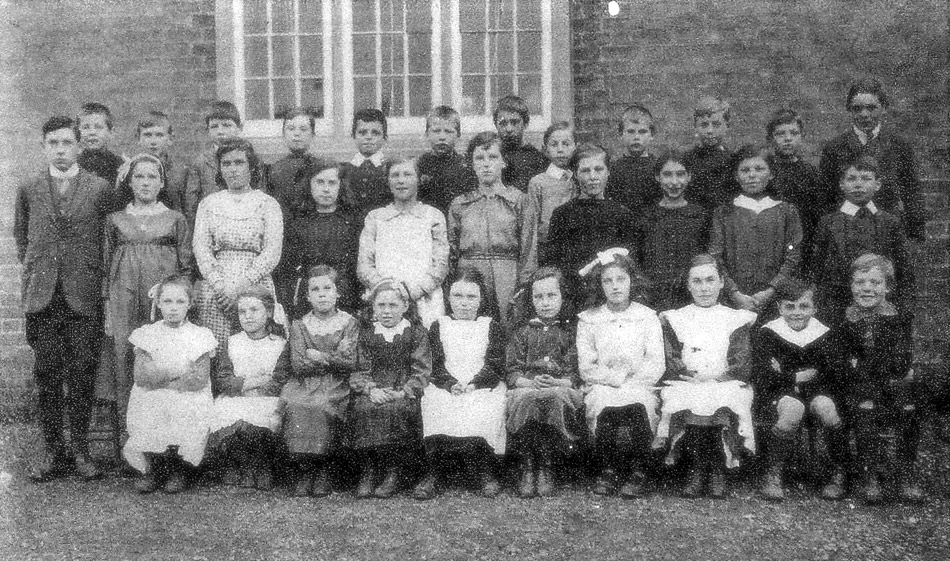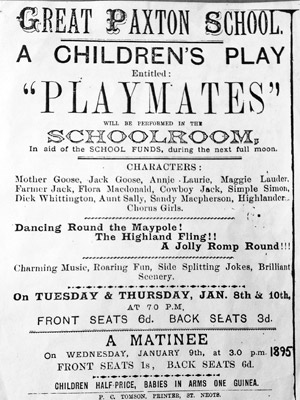Miss Maude Sarah Etchells, 1859 - 1942
Great Paxtonians
A series of articles about people who have lived in Great Paxton or have a connection with the village.
“Miss Etchells” was a teacher at Great Paxton school for nearly 50 years, she had a very significant influence on at least two generations of Great Paxton’s children.
Great Paxton Public Elementary School (mixed), was built in 1856, for 100 children, the village was somewhat ahead of the times as it wasn't until 1876 that it was recommended that education be made compulsory in the UK for all children, this wasn't fully enforced until 1880. The original school still stands on the corner of the High Street and Church Lane, now a private residence since the new school was opened in the early 1990’s.
Biographical information is a bit thin on the ground. I have attempted to put together a portrait from census records and the reminiscences of people who lived here.
Maude Etchells was born in Stoneleigh, Warwickshire on the 10th July 1859 one of 5 children, her father Edward was a school teacher, her mother died when she was 7 years old. The first record of her in Great Paxton is the 1881 census when as a 22 year old she is described as a “visitor”, living on “Main Road” with James and Annie King (agricultural labourer and wife) and their son, occupation “school mistress”.
By 1891 she had moved into the school house itself, the only occupant with four rooms at her disposal quite a contrast to most of the rest of the village who lived in two or three rooms with more people.
In 1901 (aged 42) she has her 16 year old nephew, Harry Etchells living with her in the school house, he is still there recorded as a “musical student” in 1911. The next census in 1921 is the last dated record of her in the village, she left the village in about 1928.
She was very keen on elaborate public musical performances putting on a range over the years, presumably with some help from her musical nephew Harry.
Paxton Post January 1895:
“A Children’s Play – Playmates
People came in to see it from all the villages round and were well repaid by the excellent performance they witnessed. The trouble and time expended in preparation is almost too much for so small a village and another year something requiring less labour may be attempted.”
Paxton Post 1905:
Article 1: Perhaps never before has such a large choir assembled in Great Paxton as on 23rd May. The united choirs of Eynesbury, Godmanchester and Great Paxton making up 100 voices, quite filled the Chancel, and the Nave platform, owing to the spaciousness of the old Church, the body of sound was never too great, whilst, of course, the Service was heard best from the West end. Miss Etchells had trained her choir with great care.
Article 2: The charming little Entertainment, "Robin Hood and the Abbott," given by the Great Paxton schoolchildren on June 12th and 13th, was worthy of a larger audience than came to witness it. The wreaths of flowers in the girls' hair, which can only be obtained at this season of the year, added greatly to their appearance. Their merry dances, which were performed with precision and brightness, formed one of the prettiest scenes that can be imagined. …It is scarcely necessary to add that to Miss Etchells is due the credit of training the little performers and making all the arrangements which were so well carried out.
Dick Ashton b. March 1898
We had one big room split into different classes; completely open. The school mistress Miss Etchells was on her own except for a pupil School teacher. To keep us all in order the mistress would hit us with anything she could lay her hands on. She would have us out in the passage where she hit us with a cricket bat. Sometime she'd lay about us with wickets. She was heavy with the boys. With the girls she'd hit them with a hair brush. She didn't mind pulling down a boys trousers and hitting him with that hair brush. Mind she didn't have it all her own way. During threshing time we’d get a pocket full of live mice and take them in to school and let them out. She'd jump up on her desk, all eighteen stone of her shouting for someone to get her cat.
Fred Luddington b. Sept 1898
We used to march around the room singing our times tables. We had slates for writing and arithmetic, and we started our sewing and knitting in the infants. … There was a ball-frame to learn to count.
In the Big School I accepted the discipline… Miss Etchells used a wicket on all those boys who wouldn't behave.
Miss Etchells organised Morris Dancing and always gave a concert at Christmas time. If it was deemed a success we were always bundled into traps and taken to perform at other schools.
 1902,
Miss Etchells standing at left
1902,
Miss Etchells standing at left
Rowena Bryant approx. 1910-1914
When we went up to the Big School we got pupil teachers from Standard I to II, but then in Standard III you went under Miss Etchells. She was very strict, you daren't hardly look at the next child, she made you know she was there. We girls were all a bundle of nerves. If we saw her coming up the street on her bicycle we used to run up the yard because she made you acknowledge her, you had to greet her.
In August we started to learn for our concerts at Christmas, Miss Etchells was good at them. My father used to grumble and say "I send you to school to learn not to get up concerts."
We used to have hot summers then and Mr. Hanbury who lived at Paxton Hill House used to ask Miss Etchells to send a band of girls dressed as fairies to dance around his garden for him, in and out of the bushes. We had wire wings covered in net. He'd send his carriage down to the school for us, no more than a dozen girls. I always got chosen because father was on the railway, had a few shillings more, so I was considered smarter than some. After our dancing, and we had to behave ourselves with Miss Etchells, we was all given tea on the lawn. The maids would come out and serve us. Mr. Hanbury was a man of means with two daughters, spinsters, they'd sit down and watch us dance. We'd be afraid of doing it wrong.
 The School Pupils in 1919
The School Pupils in 1919
Bert Goodwin b. Jan 1921
Miss Etchells was schoolmistress when I first went to school, as she was when my mother went to school. A teacher of the old type, she was very stern, very strict, sometimes even cruel, but always very fair. She would help anyone who was willing, but woe betide anyone she thought was slacking. She believed strongly in the three R’s, the main curriculum at that time. Wrongdoers were either caned, or for lesser misdemeanours were stood in a corner with hands above the head. To me, this was even worse than the cane, as it held a child up to ridicule, and also they sometimes forgot that you were there. One child fainted as a result, and the practice was then stopped for some time. On some evenings we would have to go and collect wild flowers for school next day, to see who could get the greatest number of different species, and a nature study lesson was given on them, She was strongly backed by the Towgoods of Paxton Hall, and also by the vicar, who gave scripture lessons once or twice a week.
Any wrong-doing outside the school would be reported, irrespective of what it was, and even if you had already been punished for it. I remember Miss Etchells coming out of the schoolhouse one evening with the cane, to whip two boys who were fighting on the green.
A slightly different, more relaxed regime came to the village with Miss Coles, a much younger teacher. We now went for nature walks in school time, while painting, and periods of reading quietly to oneself, became popular. The dunce's cap went out, but the cane still hung in its rightful place, though less used. In this period, children were not taught so rigorously, and very seldom did any get to the grammar school. I remember taking the 11+ down at St. Neots; no one passed.
Maude Etchells left Great Paxton probably in 1928 when she was 69 years old, she had taught here since she was 22 taking full classes to the end. Despite her age, there was no retirement yet, she went to be a private tutor in the village of Morcott in Rutland, invited there by Mr. Fydell G. Rowley, the squire of St. Neots. Morcott was his ancestral home, he owned most of it, and wanted the best teacher he could get for its school.
She is recorded in the Register of 1939 as a “retired schoolmistress” at the house of a Mr. and Mrs. Pond in Stamford Lincolnshire a place she had connections with as a newly qualified young teacher in 1880. She died there in January 1942 aged 83.



